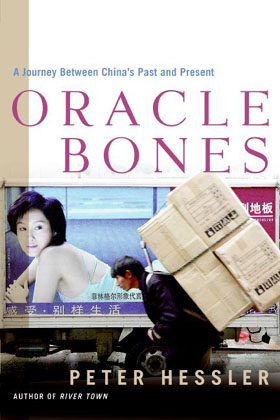These days books about China are filled with numbers cold, hard statistics.
It's understandable. After all, China is the world's fastest-growing economy.
At this point in its history, the nation's best storyteller is probably an
accountant.
But behind the remarkable figures are stories of ordinary, everyday people.
And in his new book, "Oracle Bones: A Journey Between China's Past and
Present," Peter Hessler tells the story of two such people who are part of the
driving force behind China's economic rise migrant workers.

The title refers to the first known writing in China scraps of bones and
shells inscribed with divinations, which date back about 3,000 years. Scholars
who study the bones have tried to piece together a vision of Chinese culture
back then, and Hessler said he tried to do the same with today's China by
drawing together various characters.
Hessler, an American, has lived in China for about 10 years, most recently as
the Beijing correspondent for The New Yorker magazine and a contributor to
National Geographic magazine.
It was in his first incarnation, however, as a Peace Corps volunteer English
teacher for two years from 1996 in Fuling, in Southwest China's Chongqing
Municipality, where he met the two students.
One of the students featured in the book, who adopted the English name
William Jefferson Foster, grows up in an illiterate family and goes on to become
a teacher after leaving his small village to join the exodus of migrant workers
in East China's Zhejiang Province.
The other student, whose English name is Emily, ends up working six days a
week as a factory girl in Shenzhen in the southern province of Guangdong.
"I do think there are a lot of books that look at the economic side of China,
and that is really important and is probably the way to view this place now,"
said Hessler, 37, who lives in Beijing.
"But that's an improvement from what the case was maybe five or 10 years ago,
when a lot of books were heavily political.
"My book isn't about the big economic picture, but it is economic in the
sense that the people that I write about are involved in the new economy here in
various ways, and all of them are trying to cope with it and benefit from it."
(For more biz stories, please visit Industry Updates)